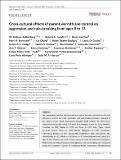Cross‐cultural effects of parent warmth and control on aggression and rule‐breaking from ages 8 to 13
Publication Date
2020Author
W Andrew Rothenberg, Jennifer E Lansford, Dario Bacchini, Marc H Bornstein, Lei Chang, Kirby Deater‐Deckard, Laura Di Giunta, Kenneth A Dodge, Patrick S Malone, Paul Oburu, Concetta Pastorelli, Ann T Skinner, Emma Sorbring, Laurence Steinberg, Sombat Tapanya, Liliana Maria Uribe Tirado, Saengduean Yotanyamaneewong, Liane Peña Alampay, Suha M Al‐Hassan
Metadata
Show full item recordAbstract/
We investigated whether bidirectional associations between parental warmth and behavioral control and child aggression and rule‐breaking behavior emerged in 12 cultural groups. Study participants included 1,298 children (M = 8.29 years, standard deviation [SD] = 0.66, 51% girls) from Shanghai, China (n = 121); Medellín, Colombia (n = 108); Naples (n = 100) and Rome (n = 103), Italy; Zarqa, Jordan (n = 114); Kisumu, Kenya (n = 100); Manila, Philippines (n = 120); Trollhättan/ Vänersborg, Sweden (n = 101); Chiang Mai, Thailand (n = 120); and Durham, NC, United States (n = 111 White, n = 103 Black, n = 97 Latino) followed over 5 years (i.e., ages 8–13). Warmth and control were measured using the Parental Acceptance‐ Rejection/Control Questionnaire, child aggression and rule‐breaking were measured using the Achenbach System of Empirically‐Based Assessment. Multiple‐group structural equation modeling was conducted. Associations between parent warmth and subsequent rule‐breaking behavior were found to be more common across ontogeny and demonstrate greater variability across different cultures than associations between warmth and subsequent aggressive behavior. In contrast, the evocative effects of child aggressive behavior on subsequent parent warmth and behavioral control were more common, especially before age 10, than those of rule‐ breaking behavior. Considering the type of externalizing behavior, developmental time point, and cultural context is essential to understanding how parenting and child behavior reciprocally affect one another
Collections
- Department of Psychology [216]

